Both the French Superseries men’s singles winner and the runner-up failed to proceed but semi-finals ticket-holders were still treated to badminton action of a kind your life would be poorer for not experiencing live.
By Aaron Wong, Badzine Correspondent live in Sydney. Photos: Badmintonphoto (live)
Five summers later
Men’s singles on Court 2 was superior to their London 2012 Olympic bronze medal play off and all the more interesting for this being the very first meeting between Chen Long and Lee Hyun Il since that occasion five summers ago. Chen Long avoided the fate of the other Olympic bronze medallist who denied Lee – Chen Jin took bronze at Beijing 2008, thus relegating Lee to fourth place at those Olympics but the Korean beat him three times in the next four years, most recently at the next Olympic Games, just before losing to Chen Long.
The day before, there was a match with two influential men playing freely. Here’s what happens when one returns and you add tension to it. The first game was as humanly perfect as it gets. Lessons were being learnt by both. Lee was punished once for lifting shorter than the rear doubles service line and that was sufficient. Five years on, Lee wasn’t framing the returns of Chen’s smashes any more – having practised on Viktor Axelsen and Jan Jorgensen in the meantime – and they flew back over out of stretching reach even for the tall Chinese.
At first Chen allowed Lee to display his wares and lead the rhythm as he would any opponent. As the first game grew tighter towards and beyond deuce, neither man pressed on the pedal explicitly as both had tried it and failed up to the first interval. During this period, the match became a camping list of every shot in the book imaginable. The patience with which both played out long rallies using shots with little room for error was a heart palpitating experience for the audience. One simple thought compounded in everybody’s minds: how do they do it over and over again in one rally, and again the next.
Lee’s cross court net shots were the most sensational but ultimately also cost him the game when the last forehand version slid alone the tape on his side.
Chen’s forehand down the line smashes were unbelievably accurate and his go-to weapon. Lee was no less bewitching on the same side, which is also his forehand, with convex arcing dropshots produced so finely both at the point of impact and its destination that even though Chen saw them over and over, sometimes three in succession, and knew they were probably coming he didn’t want to move early for them. This was some kind of mark of respect from the 28 year old Chinese to the 37 year old Korean.
In badminton, especially in singles, you have to be lucky when your errors occur because of the unforgiving 21 points rally score system. It happens time and again when you least expect it. A good example was Nehwal’s coming after the rubber game interval wasted her build up but Sun’s before the same interval didn’t. Chen Long’s second game was abysmally full of them but Lee’s handful of critical ones distributed during the first deuce and unfortunately after the critical rubber interval cost him the match.
Interestingly, Lee Hyun Il didn’t rue his performance in the first game at all. “It’s not that crucial because I went into the match thinking it’d be three games anyway.”
Of playing better now than when he was much younger and in the national team, he agreed. “When I was in the national team I felt the pressure and expectation of to win every game and entered into slump phases when I didn’t. There’s none of that weighing me down anymore and that’s why.
“I remember how national training works and developed my own program. Since I’ve played 19, 20 years [competitively] my style has become my own. As a result of trial and error I try to hit the shuttlecock where opponents can’t predict. I also worked out strategies to make them run more and myself not have to.”
Chen Long won 26-24, 15-21, 21-17, to set up a final against last weekend’s Indonesia Superseries Premier winner Srikanth Kidambi (pictured) of India, who took care of the other French Open finalist, winner Shi Yuqi of China.
R32 became SF
Page 26 of the Australian Open souvenir magazine, entitled Japan Reaching New Heights, calls attention to Nozomi Okuhara (pictured) and Akane Yamaguchi. That’s prescient isn’t it? Because it will be all Nippon representation in the last women’s singles.
Within the same four page segment is printed a Japanese proverb translated as ‘with many little strokes a large tree is felled’ which conveniently alludes to Okuhara’s win over Sun Yu, 21-18, 18-21, 21-14.
A day earlier down 13-15 in the rubber, Sun Yu was given gifts of easy points by Saina Nehwal. At the same juncture, she handed over those gifts and more to the Japanese by deciding to press on the offense.
Compared to their first round bout at the previous Australian, Sun Yu (pictured) wasn’t tired and she typically doesn’t pick up the pace. Perhaps this is the reason why, unforced errors ensue unabated. She was more dangerous to Okuhara when exhausted and playing the retriever.
Okuhara was her standard self and not the heightened one from their 2016 encounter whose winners and desperate saves were off the wall. That said, her general condition needed to be fully healthy for an athlete only the height of the poles holding up the net to mount any sort of equal footing against 183cm Sun Yu.
“I want to show in Australia on TV that Japan’s women’s singles badminton is at a very high level. Last week Sayaka Sato win in Indonesia and this week Akane Yamaguchi and me in the final in Sydney,” said Okuhara. “Last week Akane beat me. This week I’ll challenge her.”
Finals line-up
WS: Akane Yamaguchi (JPN) [3] vs. Nozomi Okuhara (JPN)
WD: Misaki Matsutomo / Ayaka Takahashi (JPN) [1] vs. Christinna Pedersen / Kamilla Rytter Juhl (DEN) [2]
MS: Chen Long (CHN) vs. Kidambi Srikanth (IND)
MD: Takeshi Kamura / Keigo Sonoda (JPN) [3] vs. Hendra Setiawan (INA) / Tan Boon Heong (MAS)
XD: Zheng Siwei / Chen Qingchen (CHN) [1] vs. Praveen Jordan / Debby Susanto (INA) [7]
Click here for complete semi-final results
![AUSTRALIAN OPEN 2017 SF – As humanly perfect as it gets Both the French Superseries men’s singles winner and the runner-up failed to proceed but semi-finals ticket-holders were still treated to badminton action of a kind your life would be poorer […]](https://www.badzine.net/wp-content/uploads/ngg_featured/20170624_1633_AustraliaOpen2017_BPRS5662_rotator.jpg)
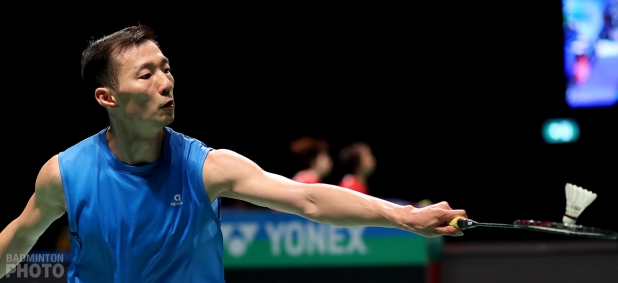
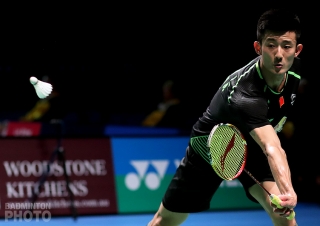
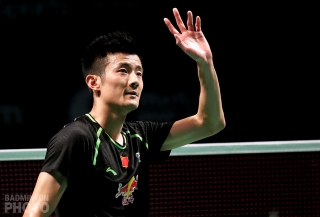
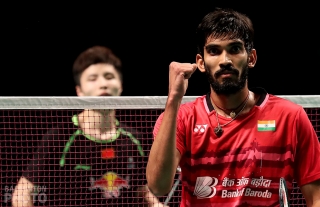
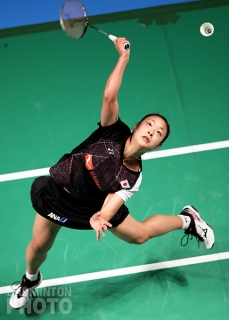
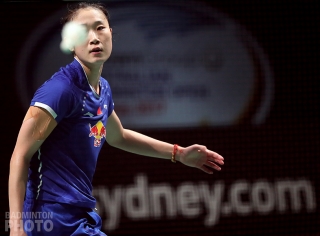
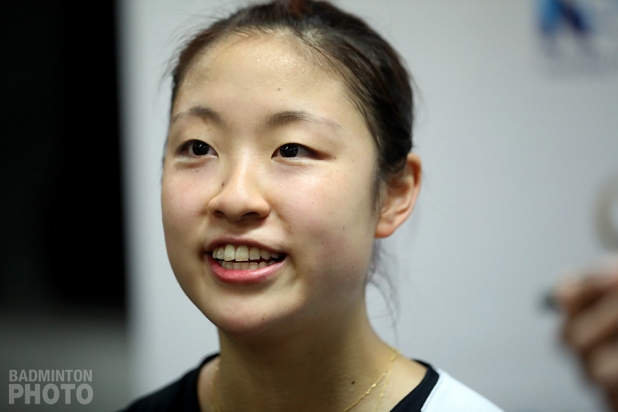

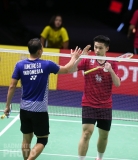
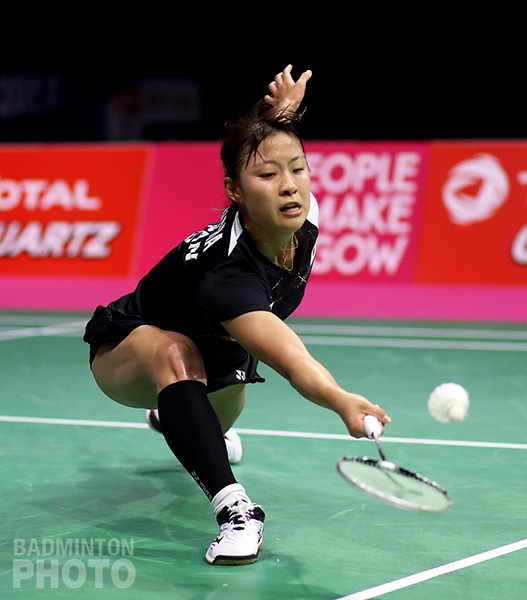
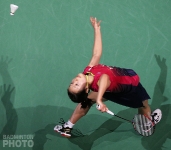
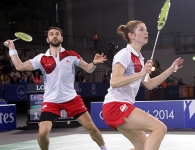
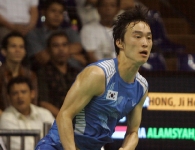
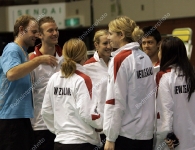
Leave a Reply